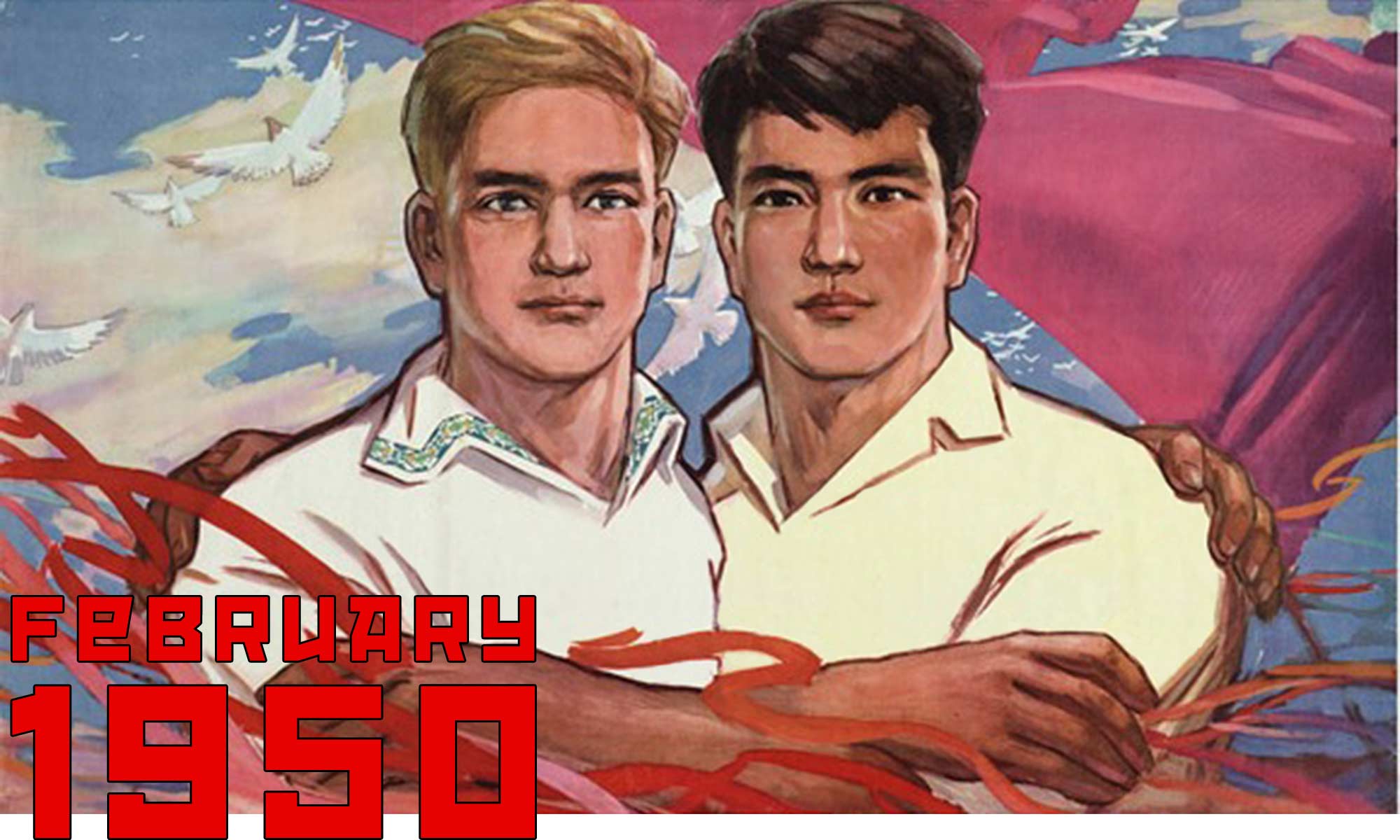| ◄ FEBRUARY ► | ||||||
|---|---|---|---|---|---|---|
| ◄ 1950 ► | ||||||
| 1 | 2 | 3 | 4 | |||
| 5 | 6 | 7 | 8 | 9 | 10 | 11 |
| 12 | 13 | 14 | 15 | 16 | 17 | 18 |
| 19 | 20 | 21 | 22 | 23 | 24 | 25 |
| 26 | 27 | 28 | ||||
| President: | Harry S. Truman (D) | |||
| Vice-President: | Alben W. Barkley (D) | |||
| House: | 263 (D) | 167 (R) | 2 (Other) | 3 (Vacant) |
| Southern states: | 103 (D) | 2 (R) | ||
| Senate: | 54 (D) | 42 (R) | ||
| Southern states: | 22 (D) | |||
| GDP growth: | 7.3 % | (Annual) | ||
| 3.0 % | (Quarterly) | |||
| Fed discount rate: | 1½ % | |||
| Inflation: | -1.3 % | |||
| Unemployment: | 6.4 % | |||
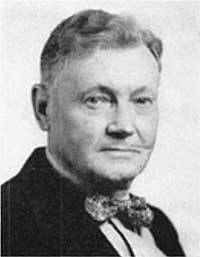 February: The FBI Law Enforcement Bulletin indulges the agency’s “sex-fueled imagination.” The University of Nebraska’s Dr. James M. Reinhardt writes, “It is my contention that any form of sex perversion tends to bring about the degeneration of the personality of the pervert. … He heeds no warnings and is insensitive to consequences. … The bank robber, embezzler, the forger, even the hired murderer, hopes to enhance his social security and prestige with the fruits of his crime. Not so the perverted sex criminal. His fiendish craving is devoid of any social ‘link.’ He is the most sordidly selfish of all criminals and inherently the most intolerable.”
February: The FBI Law Enforcement Bulletin indulges the agency’s “sex-fueled imagination.” The University of Nebraska’s Dr. James M. Reinhardt writes, “It is my contention that any form of sex perversion tends to bring about the degeneration of the personality of the pervert. … He heeds no warnings and is insensitive to consequences. … The bank robber, embezzler, the forger, even the hired murderer, hopes to enhance his social security and prestige with the fruits of his crime. Not so the perverted sex criminal. His fiendish craving is devoid of any social ‘link.’ He is the most sordidly selfish of all criminals and inherently the most intolerable.”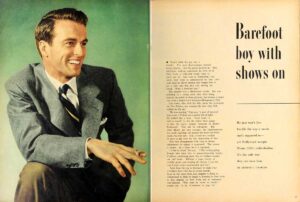 February: Modern Screen examines the “Barefoot Boy”. Arthur L. Charles interviews the enigmatic method actor Montgomery Clift, and finds a man who is suspicious of the Hollywood publicity machine and fiercely protective of his private life: “When writers ask him for permission to interview his mother or father or older brother or twin sister for background material, Clift always politely refuses. … To date, Clift’s feelings about his family have been honored — largely because, when he does grant interviews, he’s quite cooperative in telling all about himself. All, that is, except about something his family probably wouldn’t know about anyway: his love life. ‘I like girls,’ he says flatly. ‘All kinds of girls. But I just won’t drag any particular girl I like into the spotlight by talking about her to reporters. And I can’t describe what type of girl I like better than another — I just don’t know. If I meet a girl I like, then I ask her for a date. That’s all there is to it.'”
February: Modern Screen examines the “Barefoot Boy”. Arthur L. Charles interviews the enigmatic method actor Montgomery Clift, and finds a man who is suspicious of the Hollywood publicity machine and fiercely protective of his private life: “When writers ask him for permission to interview his mother or father or older brother or twin sister for background material, Clift always politely refuses. … To date, Clift’s feelings about his family have been honored — largely because, when he does grant interviews, he’s quite cooperative in telling all about himself. All, that is, except about something his family probably wouldn’t know about anyway: his love life. ‘I like girls,’ he says flatly. ‘All kinds of girls. But I just won’t drag any particular girl I like into the spotlight by talking about her to reporters. And I can’t describe what type of girl I like better than another — I just don’t know. If I meet a girl I like, then I ask her for a date. That’s all there is to it.'”▲Wednesday, February 1
![]() Feb 1-2: Mine owners walk out of talks to end coal strike. Two days of talks between the United Mine Workers and bituminous (soft) coal mine operators end in failure when Northern and Western operators walk out, saying it is useless and misleading to continue meetings. Southern operators walk out of separate talks a short time later. The mine owners agree to accept President Truman’s proposal for a 70-day truce and the appointment of a three-man presidential fact-finding board to resolve the seven month-long labor dispute.
Feb 1-2: Mine owners walk out of talks to end coal strike. Two days of talks between the United Mine Workers and bituminous (soft) coal mine operators end in failure when Northern and Western operators walk out, saying it is useless and misleading to continue meetings. Southern operators walk out of separate talks a short time later. The mine owners agree to accept President Truman’s proposal for a 70-day truce and the appointment of a three-man presidential fact-finding board to resolve the seven month-long labor dispute.
▲Thursday, February 2
![]() Feb 2: France approves pact to grant Vietnam limited sovereignty. France’s normally fractious National Assembly comes together and ratifies a pact with the State of Vietnam under former emperor Bao Dai. The pact grants the French colony limited sovereignty as a part of the French Union, which is meant to operate similarly to the British Commonwealth but with France retaining control over foreign and military affairs. The National Assembly’s sudden unity comes two days after the Soviet Union recognizes the break-away Vietminh movement under Ho Chi Minh, who has proclaimed the establishment of the Democratic Republic of Vietnam. France’s pact clears the way for American and British recognition of the Bao Dai regime.
Feb 2: France approves pact to grant Vietnam limited sovereignty. France’s normally fractious National Assembly comes together and ratifies a pact with the State of Vietnam under former emperor Bao Dai. The pact grants the French colony limited sovereignty as a part of the French Union, which is meant to operate similarly to the British Commonwealth but with France retaining control over foreign and military affairs. The National Assembly’s sudden unity comes two days after the Soviet Union recognizes the break-away Vietminh movement under Ho Chi Minh, who has proclaimed the establishment of the Democratic Republic of Vietnam. France’s pact clears the way for American and British recognition of the Bao Dai regime.
![]() Feb 2: The popular game show What’s My Line? debuts on CBS. It will run until 1967.
Feb 2: The popular game show What’s My Line? debuts on CBS. It will run until 1967.
▲Friday, February 3
![]()
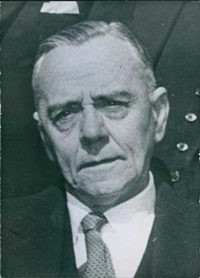 Feb 3: South Africa Minister threatens to deport “slandering” journalists. South Africa’s Economic Affairs Minister Eric Louw says that all foreign journalists who “slander” South Africa should be deported. The Government Minister is responding to foreign criticism of the National Party’s apartheid policies. He says, “The Government has no intention of restricting freedom of the press in the generally accepted sense, but the opposition seems to make no distinction between freedom and misuse of information.”
Feb 3: South Africa Minister threatens to deport “slandering” journalists. South Africa’s Economic Affairs Minister Eric Louw says that all foreign journalists who “slander” South Africa should be deported. The Government Minister is responding to foreign criticism of the National Party’s apartheid policies. He says, “The Government has no intention of restricting freedom of the press in the generally accepted sense, but the opposition seems to make no distinction between freedom and misuse of information.”
![]()
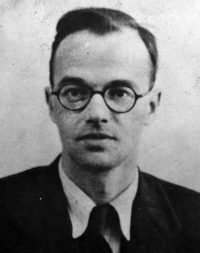 Feb 3: Arrest of Kause Fuchs is disclosed. Britain publicly reveals that it has arrested German-born atomic physicist Klaus Fuchs, and charged him violating the Official Secrets Act by spying for the Soviet Union. One of the charges leveled against him in London’s historic Bow Street Magistrate’s Court is that “on a day in February, 1945, in the United States” he “communicated to a person unknown information relating to atomic research which was calculated to be, or might be, directly or indirectly useful to an enemy.” Fuchs, who acquired British citizenship in 1942, works at the main British atomic research center at Harwell. Fuchs had worked at Los Alamos from 1943 to 1946 before returning to Britain to work at Harwell. The person Fuchs communicated with was American lab chemist Harry Gold, who will lead investigators to Julius and Ethel Rosenberg. Fuchs gave a full confession to MI5 in January.
Feb 3: Arrest of Kause Fuchs is disclosed. Britain publicly reveals that it has arrested German-born atomic physicist Klaus Fuchs, and charged him violating the Official Secrets Act by spying for the Soviet Union. One of the charges leveled against him in London’s historic Bow Street Magistrate’s Court is that “on a day in February, 1945, in the United States” he “communicated to a person unknown information relating to atomic research which was calculated to be, or might be, directly or indirectly useful to an enemy.” Fuchs, who acquired British citizenship in 1942, works at the main British atomic research center at Harwell. Fuchs had worked at Los Alamos from 1943 to 1946 before returning to Britain to work at Harwell. The person Fuchs communicated with was American lab chemist Harry Gold, who will lead investigators to Julius and Ethel Rosenberg. Fuchs gave a full confession to MI5 in January.
▲Saturday, February 4
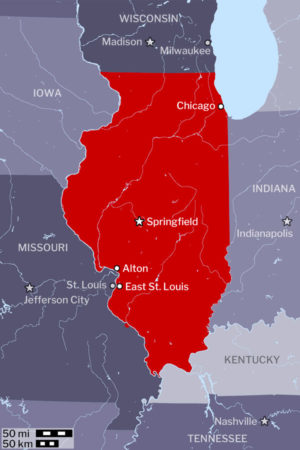 Feb 4: Two crosses burn at Alton, Illinois. The first cross is spotted on the Missouri side of the Mississippi River at Alton Dam at about 8:30 p.m. Its location makes it clearly visible from downtown Alton. The second cross is burned in a vacant lot in the African-American part of town at about 11:00 p.m. The cross-burnings follow reports of renewed Ku Klux Klan activity in the area. The day before, the NAACP filed a lawsuit on behalf of several African-American parents to enjoin the state from funding Alton’s public schools under a state regulation denying aid to districts practicing segregation. State law has prohibited racial segregation in public schools for several years, but it has been widely ignored in the southern part of the state. Last year, the state implemented a new regulation barring state funds from segregated school districts. East St. Louis bowed to pressure and peacefully integrated its schools earlier this week. The Alton school board stands to lose about $288,000 a year (about $3.2 million today) if state funding is cut. Several black Alton residents report that they have been receiving harassing and threatening phone calls since the lawsuit was filed. Gov. Adlai Stevenson warns that “Illinois will not tolerate the Ku Klux Klan or any organized racial hatred or intimidation.”
Feb 4: Two crosses burn at Alton, Illinois. The first cross is spotted on the Missouri side of the Mississippi River at Alton Dam at about 8:30 p.m. Its location makes it clearly visible from downtown Alton. The second cross is burned in a vacant lot in the African-American part of town at about 11:00 p.m. The cross-burnings follow reports of renewed Ku Klux Klan activity in the area. The day before, the NAACP filed a lawsuit on behalf of several African-American parents to enjoin the state from funding Alton’s public schools under a state regulation denying aid to districts practicing segregation. State law has prohibited racial segregation in public schools for several years, but it has been widely ignored in the southern part of the state. Last year, the state implemented a new regulation barring state funds from segregated school districts. East St. Louis bowed to pressure and peacefully integrated its schools earlier this week. The Alton school board stands to lose about $288,000 a year (about $3.2 million today) if state funding is cut. Several black Alton residents report that they have been receiving harassing and threatening phone calls since the lawsuit was filed. Gov. Adlai Stevenson warns that “Illinois will not tolerate the Ku Klux Klan or any organized racial hatred or intimidation.”![]()
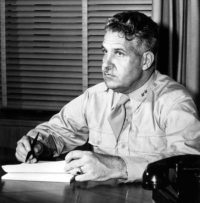 Feb 4: Manhattan Project Director: Fuchs gave the Soviets a head start on atom and hydrogen bombs. U.S. Army Lt. Gen. Leslie R. Groves, former Director of the Manhattan Project to develop the atomic bomb, testifies in a closed hearing before the Joint Congressional Committee on Atomic Energy that because of the secrets that Klaus Fuchs passed to the U.S.S.R., the Soviets not only had an easier time developing its atomic bomb, but that it also has a head start in the race to develop the hydrogen bomb. Groves also testifies that the British were responsible for providing security clearances for Fuchs and other British nationals sent to the U.S. to aid in the bomb’s development.
Feb 4: Manhattan Project Director: Fuchs gave the Soviets a head start on atom and hydrogen bombs. U.S. Army Lt. Gen. Leslie R. Groves, former Director of the Manhattan Project to develop the atomic bomb, testifies in a closed hearing before the Joint Congressional Committee on Atomic Energy that because of the secrets that Klaus Fuchs passed to the U.S.S.R., the Soviets not only had an easier time developing its atomic bomb, but that it also has a head start in the race to develop the hydrogen bomb. Groves also testifies that the British were responsible for providing security clearances for Fuchs and other British nationals sent to the U.S. to aid in the bomb’s development.
![]()
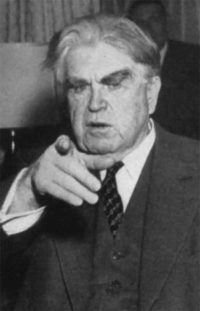 Feb 4: UMW rejects Truman’s 70-day truce proposal. United Mine Workers union president John L. Lewis rejects President Truman’s call for a 70-day truce while a three-man presidential fact–finding commission works out a solution to the seven-month labor dispute between the UMW and bituminous (soft) coal operators. The miners had been working a three-day-a-week schedule in lieu of a full work stoppage to ensure adequate coal supplies through the winter months. But a wildcat strikes began in January that has shut down almost a third of mining operations. The 100,000 striking miners have made it clear that they have no intention of working the abbreviated schedule and demand a full five-day schedule at full pay under a signed contract. This increases pressure on President Truman to invoke the Taft-Hartley Act and seek a court injunction ordering the coal miners back to work for eighty days. Lewis acknowledges that possibility in his letter to Truman, but warns, “It is questionable whether one could postulate that such mass coercion would ensure enthusiastic service from grateful men.”
Feb 4: UMW rejects Truman’s 70-day truce proposal. United Mine Workers union president John L. Lewis rejects President Truman’s call for a 70-day truce while a three-man presidential fact–finding commission works out a solution to the seven-month labor dispute between the UMW and bituminous (soft) coal operators. The miners had been working a three-day-a-week schedule in lieu of a full work stoppage to ensure adequate coal supplies through the winter months. But a wildcat strikes began in January that has shut down almost a third of mining operations. The 100,000 striking miners have made it clear that they have no intention of working the abbreviated schedule and demand a full five-day schedule at full pay under a signed contract. This increases pressure on President Truman to invoke the Taft-Hartley Act and seek a court injunction ordering the coal miners back to work for eighty days. Lewis acknowledges that possibility in his letter to Truman, but warns, “It is questionable whether one could postulate that such mass coercion would ensure enthusiastic service from grateful men.”
![]()
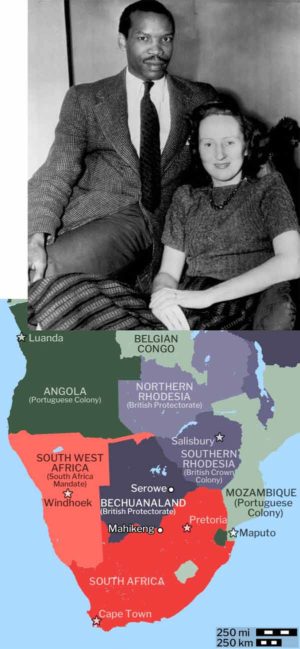 Feb 4: British Cabinet refuses to recognize Bechuanaland chief over interracial marriage. The British Cabinet is reported to have decided against recognizing Seretse Khama as chief of the African Bamangwato tribe of the British protectorate of Bechuanaland (Botswana). In 1947, Khama married Ruth Williams, a white clerk at Lloyds of London, while he was in London to study law. The marriage was extremely controversial, both among whites in Britain and South Africa, and among the Bamangwato people. But by 1949, when the chief and his bride moved to a simple bungalow in Serowe, the Bamangwato people’s capital, the “White Queen” gained enormous popularity and respect. Seretse overcame challenges to his position within his tribe due to his marriage, and he was confirmed its prince. But just across the border in South Africa, her presence nearby has outraged Prime Minister D.F. Malan and his government, which is moving to impose a strict apartheid regime. Malan has already banned the couple from entering Mafikeng, a town in South Africa which serves as Bechuanaland’s administrative capital. This puts an added strain on South Africa’s relationship with Britain. The British Labour government of Clement Attlee, which is already struggling with tight post-war economic conditions, cannot afford to lose access to cheap South African gold and uranium, nor can it risk South African economic or military actions against Bechuanaland.
Feb 4: British Cabinet refuses to recognize Bechuanaland chief over interracial marriage. The British Cabinet is reported to have decided against recognizing Seretse Khama as chief of the African Bamangwato tribe of the British protectorate of Bechuanaland (Botswana). In 1947, Khama married Ruth Williams, a white clerk at Lloyds of London, while he was in London to study law. The marriage was extremely controversial, both among whites in Britain and South Africa, and among the Bamangwato people. But by 1949, when the chief and his bride moved to a simple bungalow in Serowe, the Bamangwato people’s capital, the “White Queen” gained enormous popularity and respect. Seretse overcame challenges to his position within his tribe due to his marriage, and he was confirmed its prince. But just across the border in South Africa, her presence nearby has outraged Prime Minister D.F. Malan and his government, which is moving to impose a strict apartheid regime. Malan has already banned the couple from entering Mafikeng, a town in South Africa which serves as Bechuanaland’s administrative capital. This puts an added strain on South Africa’s relationship with Britain. The British Labour government of Clement Attlee, which is already struggling with tight post-war economic conditions, cannot afford to lose access to cheap South African gold and uranium, nor can it risk South African economic or military actions against Bechuanaland.
▲Sunday, February 5
▲Monday, February 6
Waitangi Day (New Zealand)
![]() Feb 6: Truman invokes Taft-Hartley Act to order coal miners back to work for 80-day cooling off period. With fewer than 30,000 out of 400,000 bituminous coal miners showing up for work this morning, President Truman invokes the Taft-Hartley Act and orders the miners back to work. He also appoints an emergency three-man board to study the dispute and report back to him by next Monday. Under Taft-Hartley, Truman will have to seek a court injunction to compel the miners to go back to work for eighty days. The Taft-Hartley Act had been passed over Truman’s veto in 1947 and Truman has repeatedly vowed to get the act repealed since then. Despite that, this is now the eighth time Truman has invoked Taft-Hartley to deal with a crippling strike.
Feb 6: Truman invokes Taft-Hartley Act to order coal miners back to work for 80-day cooling off period. With fewer than 30,000 out of 400,000 bituminous coal miners showing up for work this morning, President Truman invokes the Taft-Hartley Act and orders the miners back to work. He also appoints an emergency three-man board to study the dispute and report back to him by next Monday. Under Taft-Hartley, Truman will have to seek a court injunction to compel the miners to go back to work for eighty days. The Taft-Hartley Act had been passed over Truman’s veto in 1947 and Truman has repeatedly vowed to get the act repealed since then. Despite that, this is now the eighth time Truman has invoked Taft-Hartley to deal with a crippling strike.
![]()
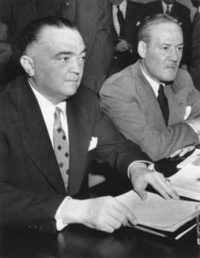 Feb 6: FBI director testifies about Klaus Fuchs’s “sympathy with Communist ideology.” F.B.I director J. Edgar Hoover and his assistant (and lover) Clyde Tolson testify in a closed hearing before the Joint Congressional Committee on Atomic Energy. They tell the committee that accused spy Klaus Fuchs had a very long record of “sympathy with Communist ideology,” according to Sen. Brien McMahon (D-CT), who briefed reporters afterward. Hoover confirmed that the German-born Fuchs had been interred in Canada in 1940 as a enemy (German) alien, and was released in 1941 to begin atomic research work for the British. He was given British citizenship in 1942. Hoover said that it had been fairly easy to determine “the Communistic background” of Fuchs’s family, and he couldn’t explain why the British failed to do so. Hoover also explained that under the law at the time, the FBI did not conduct background investigations for Manhattan Project employees until 1947.
Feb 6: FBI director testifies about Klaus Fuchs’s “sympathy with Communist ideology.” F.B.I director J. Edgar Hoover and his assistant (and lover) Clyde Tolson testify in a closed hearing before the Joint Congressional Committee on Atomic Energy. They tell the committee that accused spy Klaus Fuchs had a very long record of “sympathy with Communist ideology,” according to Sen. Brien McMahon (D-CT), who briefed reporters afterward. Hoover confirmed that the German-born Fuchs had been interred in Canada in 1940 as a enemy (German) alien, and was released in 1941 to begin atomic research work for the British. He was given British citizenship in 1942. Hoover said that it had been fairly easy to determine “the Communistic background” of Fuchs’s family, and he couldn’t explain why the British failed to do so. Hoover also explained that under the law at the time, the FBI did not conduct background investigations for Manhattan Project employees until 1947.
▲Tuesday, February 7
![]() Feb 7: U.S., Britain recognize State of Vietnam. The U.S. and Great Britain extend diplomatic recognition to the State of Vietnam in French Indo-China. Recognition is also extended to the French Protectorates of Laos and Cambodia, which attained limited self-government powers in 1949. New Zealand and Belgium will follow suit the next day.
Feb 7: U.S., Britain recognize State of Vietnam. The U.S. and Great Britain extend diplomatic recognition to the State of Vietnam in French Indo-China. Recognition is also extended to the French Protectorates of Laos and Cambodia, which attained limited self-government powers in 1949. New Zealand and Belgium will follow suit the next day.
![]() Feb 7: Coal supplies dip to 30-year low. U.S. coal supplies reach a thirty-year low when the nation’s stockpiles dip to an eighteen to nineteen-day supply. The coal strike is now inducing layoffs in other industries. The Chesapeake & Ohio, Norfolk & Western, and Pennsylvania Railroads, all of them principal coal haulers, begin issuing furlough notices to 16,500 railroad workers. The Baltimore & Ohio, which is down to a one-day reserve, confiscates about fifty cars of coal in its freight yards in Chicago, Indianapolis, and Ohio. The Interstate Commerce Commission had authorized the railroads’ seizures of in-transit coal in January to keep the trains moving. The ICC also orders a further 20% cut in coal-burning railroad service to take effect by the end of the week. The New York Central suspends forty-three passenger trains and five freight trains. Steel producers and their workers are also feeling the pinch. Wheeling Steel Corporation is cutting operations in half due to coal shortages. Youngstown Sheet and Tube has shut one blast furnace and banked three open hearths. General Motors and Ford are cutting back production, despite record demand for new cars and trucks, in order to conserve their coal stocks. Meanwhile, coal producers have cut off credit at company stores just as public and private welfare agencies struggle to provide emergency relief for miners’ families.
Feb 7: Coal supplies dip to 30-year low. U.S. coal supplies reach a thirty-year low when the nation’s stockpiles dip to an eighteen to nineteen-day supply. The coal strike is now inducing layoffs in other industries. The Chesapeake & Ohio, Norfolk & Western, and Pennsylvania Railroads, all of them principal coal haulers, begin issuing furlough notices to 16,500 railroad workers. The Baltimore & Ohio, which is down to a one-day reserve, confiscates about fifty cars of coal in its freight yards in Chicago, Indianapolis, and Ohio. The Interstate Commerce Commission had authorized the railroads’ seizures of in-transit coal in January to keep the trains moving. The ICC also orders a further 20% cut in coal-burning railroad service to take effect by the end of the week. The New York Central suspends forty-three passenger trains and five freight trains. Steel producers and their workers are also feeling the pinch. Wheeling Steel Corporation is cutting operations in half due to coal shortages. Youngstown Sheet and Tube has shut one blast furnace and banked three open hearths. General Motors and Ford are cutting back production, despite record demand for new cars and trucks, in order to conserve their coal stocks. Meanwhile, coal producers have cut off credit at company stores just as public and private welfare agencies struggle to provide emergency relief for miners’ families.
▲Wednesday, February 8
![]()
 Feb 8: Nationalist China issues air raid warnings to ten mainland cities. The Chinese Nationalist government of the Republic of China in Taiwan warns residents in ten cities on mainland China that their cities are potential targets for air raids by Nationalist bombers. Nationalist radio stations warn residents to move away from power plants, wharves, railroad stations, warehouses, factories, barracks and other military targets. The Nationalist Air Force drops warning leaflets in two of the named cities, Shanghai and Nanking (Nanjing). The other cities named in the warning are Amoy (Xiamen), Canton (Guangshou), Foochow (Fuzhou), Hangchow (Hangzhou), Hankow (Wuhan) — all of which have been raided recently — and the northern cities of Tientsin (Tianjin), Tsingtao (Qingdao), and the Communist capital of Peiping (Beijing). The Nationalists have been lengthening the air field on Chusan (Zhoushan) Island, which is the main base from which the Nationalists have been enforcing their blockade of Shanghai. Americans nationals in Shanghai are increasingly eager to evacuate the city following recent Nationalist bombing and its mining of Shanghai’s harbor. From Nationalist-held Hainan Island, where jittery defenders have been anticipating a Communist invasion any day now, come reports that the Nationalist Air Force has been busy sinking scores of small Communist boats along the Luichow (Leizhou) peninsula.
Feb 8: Nationalist China issues air raid warnings to ten mainland cities. The Chinese Nationalist government of the Republic of China in Taiwan warns residents in ten cities on mainland China that their cities are potential targets for air raids by Nationalist bombers. Nationalist radio stations warn residents to move away from power plants, wharves, railroad stations, warehouses, factories, barracks and other military targets. The Nationalist Air Force drops warning leaflets in two of the named cities, Shanghai and Nanking (Nanjing). The other cities named in the warning are Amoy (Xiamen), Canton (Guangshou), Foochow (Fuzhou), Hangchow (Hangzhou), Hankow (Wuhan) — all of which have been raided recently — and the northern cities of Tientsin (Tianjin), Tsingtao (Qingdao), and the Communist capital of Peiping (Beijing). The Nationalists have been lengthening the air field on Chusan (Zhoushan) Island, which is the main base from which the Nationalists have been enforcing their blockade of Shanghai. Americans nationals in Shanghai are increasingly eager to evacuate the city following recent Nationalist bombing and its mining of Shanghai’s harbor. From Nationalist-held Hainan Island, where jittery defenders have been anticipating a Communist invasion any day now, come reports that the Nationalist Air Force has been busy sinking scores of small Communist boats along the Luichow (Leizhou) peninsula.
▲Thursday, February 9
![]()
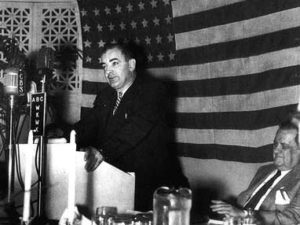 Feb 9: Joseph McCarthy in Wheeling: “I have here in my hand a list of 205 names…” With the Alger Hiss affair and the arrest of Klaus Fuchs on espionage charges still fresh on everyone’s minds, Sen. Joseph McCarthy (R-WI) gives a speech to the Republican Women’s Club in Wheeling, West Virginia, in which he alleges that Communists have infiltrated the State Department. He holds up a piece of paper and says, “While I cannot take the time to name all of the men in the State Department who have been named as members of the Communist Party and members of a spy ring, I have here in my hand a list of 205 — a list of names that were known to the Secretary of State, and who, nevertheless, are still working and shaping the policy in the State Department.”
Feb 9: Joseph McCarthy in Wheeling: “I have here in my hand a list of 205 names…” With the Alger Hiss affair and the arrest of Klaus Fuchs on espionage charges still fresh on everyone’s minds, Sen. Joseph McCarthy (R-WI) gives a speech to the Republican Women’s Club in Wheeling, West Virginia, in which he alleges that Communists have infiltrated the State Department. He holds up a piece of paper and says, “While I cannot take the time to name all of the men in the State Department who have been named as members of the Communist Party and members of a spy ring, I have here in my hand a list of 205 — a list of names that were known to the Secretary of State, and who, nevertheless, are still working and shaping the policy in the State Department.”
![]() Feb 9: House approves economic assistance to South Korea and Tawian. President Truman’s allies in the House of Representatives close ranks and pass the Far Eastern Economic Assistance bill in a 240 to 134 vote. The legislation authorizes sort-term aid to South Korean and the Chinese Nationalists on Taiwan. A similar bill, focusing solely on South Korea, was defeated three weeks ago by Republican opposition, aided by Southern Democrats, in protest over what they say is an absence of a coherent Asian policy in Truman’s State Department. Aid to Taiwan has been added to the bill to counter opponents’ claims that the Truman administration is approaching the threats posed by Communist China in a piecemeal fashion. For this vote, Administration forces make sure that there are enough Democratic votes to pass the bill alone. In the end, forty-two Republicans join them. Voting against are ninety-one Republicans, thirty-two mostly-Southern Democrats, and the House’s lone Laborite. The bill now goes to conference to iron out differences with the Senate version.
Feb 9: House approves economic assistance to South Korea and Tawian. President Truman’s allies in the House of Representatives close ranks and pass the Far Eastern Economic Assistance bill in a 240 to 134 vote. The legislation authorizes sort-term aid to South Korean and the Chinese Nationalists on Taiwan. A similar bill, focusing solely on South Korea, was defeated three weeks ago by Republican opposition, aided by Southern Democrats, in protest over what they say is an absence of a coherent Asian policy in Truman’s State Department. Aid to Taiwan has been added to the bill to counter opponents’ claims that the Truman administration is approaching the threats posed by Communist China in a piecemeal fashion. For this vote, Administration forces make sure that there are enough Democratic votes to pass the bill alone. In the end, forty-two Republicans join them. Voting against are ninety-one Republicans, thirty-two mostly-Southern Democrats, and the House’s lone Laborite. The bill now goes to conference to iron out differences with the Senate version.
▲Friday, February 10
![]() Feb 10: McCarthy says he has names of “57 card-carrying Communists.” In a recorded interview airing on a Salt Lake City radio station, Sen. Joseph McCarthy says that he has the names of 57 card-carrying Communists on the State Department payroll. On the same day, Republican Party Chairman Guy G. Gabrielson speaks at a Lincoln Day observance in Charleston, West Virginia, and condemns the Truman administration for failing to recognize “the dangerous degree to which Communists and fellow travelers have been employed in important Government jobs, especially in the State Department.”
Feb 10: McCarthy says he has names of “57 card-carrying Communists.” In a recorded interview airing on a Salt Lake City radio station, Sen. Joseph McCarthy says that he has the names of 57 card-carrying Communists on the State Department payroll. On the same day, Republican Party Chairman Guy G. Gabrielson speaks at a Lincoln Day observance in Charleston, West Virginia, and condemns the Truman administration for failing to recognize “the dangerous degree to which Communists and fellow travelers have been employed in important Government jobs, especially in the State Department.”
![]() Feb 10: Klaus Fuchs appears in Magistrates Court. At a hearing in the Bow Street Magistrates Court in London, prosecutors read part of a confession made by atomic physicist Klaus Fuchs, who had passed along atomic secrets to the Soviet Union since 1943. According to the confession, Fuchs says he acted according to his conscience and in the interest of humanity. He also confirms that he is a dedicated believer in Communism, although he now sharply disagrees with the form of Communism practiced in the Soviet Union under Stalin. Fuchs says that is why he stopped providing secret information to the Soviets a year ago.
Feb 10: Klaus Fuchs appears in Magistrates Court. At a hearing in the Bow Street Magistrates Court in London, prosecutors read part of a confession made by atomic physicist Klaus Fuchs, who had passed along atomic secrets to the Soviet Union since 1943. According to the confession, Fuchs says he acted according to his conscience and in the interest of humanity. He also confirms that he is a dedicated believer in Communism, although he now sharply disagrees with the form of Communism practiced in the Soviet Union under Stalin. Fuchs says that is why he stopped providing secret information to the Soviets a year ago.
▲Saturday, February 11
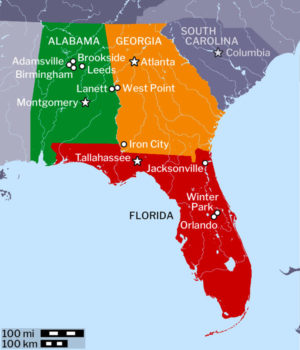 Feb 11: Dozens of fiery crosses appear in three Southern states. Thirteen burning crosses are spotted in the Orlando area alone, including eight in Orlando itself and two in Winter Park, where one is burned on the lawn of a negro clinic and another on the campus of Rollins College. In Jacksonville, five crosses erected at high points surrounding the city are set ablaze simultaneously. When a dozen or so crosses flare in the Tallahassee area, one officer remarks, “They’ve burned so many lately no one pays attention to them. I don’t know how many there were.” Four more crosses appear in nearby Iron City, Georgia. In the Birmingham area, crosses appear at a farm near Adamsville, the former coal mining community of Brookside, and on the high school grounds at Leeds. Four more crosses burn in African-American neighborhoods at Lanett, Alabama, and three more appear across the state line in West Point, Georgia. Lanett police report that the crosses are burned at the Ebenezer Baptist Church, a black-owned cafe, and in front of two African-American homes. Chief Jack Rearden says he’s puzzled. “We haven’t had any trouble at all here with the Negroes of this city.” A columnist for the Lanett newspaper begs to differ. Floyd Tillery writes in the Valley Daily Times-News that he doesn’t think “anyone should secretly burn crosses.” But he says that whoever burned them are reacting to “the filth [and] revolting immorality that exists there day and night.” He aprovingly quotes klansmen who say they are standing “for law and order and moral decency in our community, and we believe that our people — especially the women and children — should have protection” from the “undesirable conditions which the police do not seem able to control.”
Feb 11: Dozens of fiery crosses appear in three Southern states. Thirteen burning crosses are spotted in the Orlando area alone, including eight in Orlando itself and two in Winter Park, where one is burned on the lawn of a negro clinic and another on the campus of Rollins College. In Jacksonville, five crosses erected at high points surrounding the city are set ablaze simultaneously. When a dozen or so crosses flare in the Tallahassee area, one officer remarks, “They’ve burned so many lately no one pays attention to them. I don’t know how many there were.” Four more crosses appear in nearby Iron City, Georgia. In the Birmingham area, crosses appear at a farm near Adamsville, the former coal mining community of Brookside, and on the high school grounds at Leeds. Four more crosses burn in African-American neighborhoods at Lanett, Alabama, and three more appear across the state line in West Point, Georgia. Lanett police report that the crosses are burned at the Ebenezer Baptist Church, a black-owned cafe, and in front of two African-American homes. Chief Jack Rearden says he’s puzzled. “We haven’t had any trouble at all here with the Negroes of this city.” A columnist for the Lanett newspaper begs to differ. Floyd Tillery writes in the Valley Daily Times-News that he doesn’t think “anyone should secretly burn crosses.” But he says that whoever burned them are reacting to “the filth [and] revolting immorality that exists there day and night.” He aprovingly quotes klansmen who say they are standing “for law and order and moral decency in our community, and we believe that our people — especially the women and children — should have protection” from the “undesirable conditions which the police do not seem able to control.”![]() Feb 11: McCarthy claims to have a list of 300 State Department employees “certified” as security risks. Sen. Joseph McCarthy makes public a letter he sent to President Truman charging that the State Department had discharged only 80 of 300 employees who are allegedly “certified” as security risks. He adds the the dismissals were only done “after a lengthy consultation with Alger Hiss.” McCarthy demands that Truman order the State Department to release its personnel records, and he reveals his partisan motives: “Failure on your part will label the Democratic party as being the bed-fellow of international communism.” The State Department says that it will not turn over private personnel records, especially when they contain unsubstantiated claims. It instead challenges McCarthy to turn over his list of names.
Feb 11: McCarthy claims to have a list of 300 State Department employees “certified” as security risks. Sen. Joseph McCarthy makes public a letter he sent to President Truman charging that the State Department had discharged only 80 of 300 employees who are allegedly “certified” as security risks. He adds the the dismissals were only done “after a lengthy consultation with Alger Hiss.” McCarthy demands that Truman order the State Department to release its personnel records, and he reveals his partisan motives: “Failure on your part will label the Democratic party as being the bed-fellow of international communism.” The State Department says that it will not turn over private personnel records, especially when they contain unsubstantiated claims. It instead challenges McCarthy to turn over his list of names.
![]() Feb 11: Federal Court orders UMW back to work. A Federal court issues a temporary restraining order requiring United Mine Workers president John L. Lewis to order striking coal miners to return to work on Monday. Lewis complies with the order, and notifies the coal operators that he is ready to resume negotiations on Wednesday in Washington, D.C. But whether striking miners will obey Lewis’s order remains an open question. The temporary court order will remain in effect until February 21 to give the court time to decide whether to issue a broader eighty-day return-to-work injunction under the Taft-Hartley Act.
Feb 11: Federal Court orders UMW back to work. A Federal court issues a temporary restraining order requiring United Mine Workers president John L. Lewis to order striking coal miners to return to work on Monday. Lewis complies with the order, and notifies the coal operators that he is ready to resume negotiations on Wednesday in Washington, D.C. But whether striking miners will obey Lewis’s order remains an open question. The temporary court order will remain in effect until February 21 to give the court time to decide whether to issue a broader eighty-day return-to-work injunction under the Taft-Hartley Act.
![]() Feb 11: Senator says Communists are out to defeat his bill. Sen. Karl E. Mundt (R-SD) complains that American Communists have spent a million dollars to defeat his bill to require party members’ registration with the Attorney General. “They are openly bragging about it,” he says. “They are telling their followers that they can lick the bill if they can get just a few more dollars.”
Feb 11: Senator says Communists are out to defeat his bill. Sen. Karl E. Mundt (R-SD) complains that American Communists have spent a million dollars to defeat his bill to require party members’ registration with the Attorney General. “They are openly bragging about it,” he says. “They are telling their followers that they can lick the bill if they can get just a few more dollars.”
▲Sunday, February 12
Lincoln’s Birthday (US)
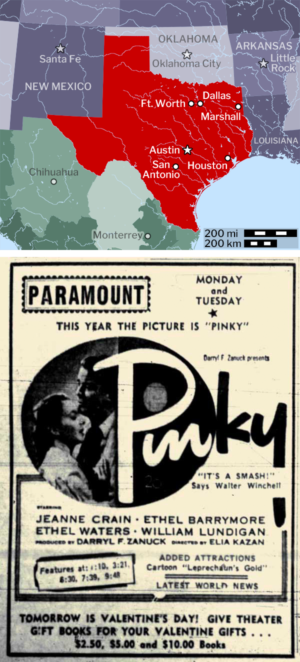 Feb 12-14: Texas theater fined for showing film featuring an interracial relationship. The Paramount Theater in Marshall, Texas, defies a city censorship board’s ruling and shows the Oscar-nominated film Pinky, directed by Elia Kazan and starring Jeanne Crain, a white actress playing Pinky Johnson, a light-skinned black woman passing as white. Several plot points in Pinky trouble city fathers. First, she is sexually assaulted by two white men after they learn she is black. Second, Pinky and a white man fall in love, and he stays in love with her after learning she’s African-American. And third — and worst of all — they embrace and kiss. Pinky is the second most popular film for 1949, but the Marshall City Commission, responding to complaints from the Kiwanis and Rotary clubs, dusts off an unused 1921 city ordinance and re-activates its Motion Picture and Vaudeville Censorship Board. The reconstituted board promptly bans the film in its “unanimous opinion that the said film is prejudicial to the best interests of the citizens of the City of Marshall.” The segregated Paramount Theater — whites on the ground floor, blacks in the balcony — shows the film anyway for a three-day run. Theater manager W.L. Gelling is arrested and charged with fifteen misdemeanors, one for each showing, and fined $100 (about $1,100 today). Gelling and East Texas Theaters, Inc., will appeal all the way to the U.S. Supreme Court, which, in a separate but similar case, will strike down the ordinance in a landmark 1952 ruling that extends First Amendment protections to films.
Feb 12-14: Texas theater fined for showing film featuring an interracial relationship. The Paramount Theater in Marshall, Texas, defies a city censorship board’s ruling and shows the Oscar-nominated film Pinky, directed by Elia Kazan and starring Jeanne Crain, a white actress playing Pinky Johnson, a light-skinned black woman passing as white. Several plot points in Pinky trouble city fathers. First, she is sexually assaulted by two white men after they learn she is black. Second, Pinky and a white man fall in love, and he stays in love with her after learning she’s African-American. And third — and worst of all — they embrace and kiss. Pinky is the second most popular film for 1949, but the Marshall City Commission, responding to complaints from the Kiwanis and Rotary clubs, dusts off an unused 1921 city ordinance and re-activates its Motion Picture and Vaudeville Censorship Board. The reconstituted board promptly bans the film in its “unanimous opinion that the said film is prejudicial to the best interests of the citizens of the City of Marshall.” The segregated Paramount Theater — whites on the ground floor, blacks in the balcony — shows the film anyway for a three-day run. Theater manager W.L. Gelling is arrested and charged with fifteen misdemeanors, one for each showing, and fined $100 (about $1,100 today). Gelling and East Texas Theaters, Inc., will appeal all the way to the U.S. Supreme Court, which, in a separate but similar case, will strike down the ordinance in a landmark 1952 ruling that extends First Amendment protections to films.▲Monday, February 13
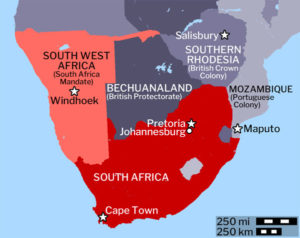 Feb 13-14: Three South Africa townships rocked by rioting. Two days of rioting flair up in three South African townships outside of Johannesburg. Natives (black Africans) in Newclare, Sophiatown and Western Native Township stone vehicles, block roads and set fire to shops. Hundreds of fire fighters and police are dispatched to the three adjoining townships. White residents in Newlands, which abuts the three Native townships, approve a resolution demanding that the government removes the “black patch.” They threaten that if the government doesn’t act, the residents will take the law into their own hands. Nationalist Prime Minister D.F. Malan attributes the violence to Communism and to recent speeches which, he claimed, “stirred up” the natives. “The time has come when non-Europeans are beginning to make demands that even the most liberal-minded could not accept. No government would accede to their demands. The supremacy of the white man must be maintained, but in such a way that justice is done to both sides.”
Feb 13-14: Three South Africa townships rocked by rioting. Two days of rioting flair up in three South African townships outside of Johannesburg. Natives (black Africans) in Newclare, Sophiatown and Western Native Township stone vehicles, block roads and set fire to shops. Hundreds of fire fighters and police are dispatched to the three adjoining townships. White residents in Newlands, which abuts the three Native townships, approve a resolution demanding that the government removes the “black patch.” They threaten that if the government doesn’t act, the residents will take the law into their own hands. Nationalist Prime Minister D.F. Malan attributes the violence to Communism and to recent speeches which, he claimed, “stirred up” the natives. “The time has come when non-Europeans are beginning to make demands that even the most liberal-minded could not accept. No government would accede to their demands. The supremacy of the white man must be maintained, but in such a way that justice is done to both sides.”![]() Feb 13: State Department deputy challenges McCarthy to produce names. John Peurifoy, the State Department’s deputy undersecretary for security, challenges Sen. Joseph McCarthy (R-WI) to supply the names of “fifty-seven card-holding Communists” who McCarthy claims are working at the State Department. Peurifoy tells reporters that he asked McCarthy for the names in a telegram sent in Saturday. “If I can find a single one, I will have him fired before sundown.” Peurifoy says he knows of no Communists on the department’s payroll, and that the President’s loyalty board did not certify 300 employees as disloyal, as McCarthy claimed, nor were there eighty employees out of such a list let go. He says that 202 employees who had been identified as possible security risks had left the department since January 1, 1947, either through resignation or reduction in force. But none of them were fired. Peurifoy emphasizes, “As far as the department can ascertain, the Senator’s alleged statements are without foundation in fact.”
Feb 13: State Department deputy challenges McCarthy to produce names. John Peurifoy, the State Department’s deputy undersecretary for security, challenges Sen. Joseph McCarthy (R-WI) to supply the names of “fifty-seven card-holding Communists” who McCarthy claims are working at the State Department. Peurifoy tells reporters that he asked McCarthy for the names in a telegram sent in Saturday. “If I can find a single one, I will have him fired before sundown.” Peurifoy says he knows of no Communists on the department’s payroll, and that the President’s loyalty board did not certify 300 employees as disloyal, as McCarthy claimed, nor were there eighty employees out of such a list let go. He says that 202 employees who had been identified as possible security risks had left the department since January 1, 1947, either through resignation or reduction in force. But none of them were fired. Peurifoy emphasizes, “As far as the department can ascertain, the Senator’s alleged statements are without foundation in fact.”
![]() Feb 13: Coal miners ignore court order. As expected, 370,000 striking coal miners ignore both the Federal court injunction and United Mine Workers president John L. Lewis’s order to return to work. What’s more, about two thousand motorized pickets roam western Pennsylvania and northern West Virginia seeking to stop operations at non-union mines. The coal mine operators say that UMW president John L. Lewis’s order to miners to go back to work stopped at the union’s district officers and didn’t reach the union locals.
Feb 13: Coal miners ignore court order. As expected, 370,000 striking coal miners ignore both the Federal court injunction and United Mine Workers president John L. Lewis’s order to return to work. What’s more, about two thousand motorized pickets roam western Pennsylvania and northern West Virginia seeking to stop operations at non-union mines. The coal mine operators say that UMW president John L. Lewis’s order to miners to go back to work stopped at the union’s district officers and didn’t reach the union locals.
▲Tuesday, February 14
Valentine’s Day
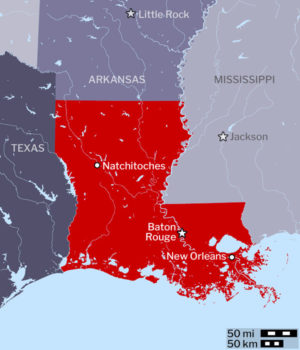 Feb 14: Shakespeare play with integrated cast forced to cancel Louisiana gig. Margaret Webster, a prominent Shakespearean actress and producer, announces that her troupe’s production of “The Taming of the Shrew,” scheduled for Februwar 2 at Natchitoches, Louisiana, was cancelled because of two black actors in the production. The actors are Austin Briggs-Hall, who plays the part of Biondello, the page to Lucentio, and Edmund Cambridge, who plays the haberdasher. Webster learned of the cancellation in a letter from Dr. Sherrod Towns, head of the music department at Northwestern State College in Natchitoches: “…We are certain that you can understand and appreciate our concern over the particular parts these two people are to play. Unfortunately, we are entirely too far in the deep South to have them appear on the stage. While this letter is not the place or occasion to philosophize on the evils of segregation, suffice it to say that to date, negroes have not appeared in our auditorium in companies of their own, much less mixed groups, and we frankly feel that the time to begin the practice in this area has not yet arrived.” Webster says she cast the two actors because they were “the best possible actors for the particular parts” and refuses to withdraw them from the production. College president Dr. G.W. McGinty says that the state board of education forced the play’s cancellation, and that “we had nothing to do with it.” He refused to comment on whether the he agreed with the board’s action. But one board member says that the question of the troupe’s appearance at Northwestern State did not come up before the board.
Feb 14: Shakespeare play with integrated cast forced to cancel Louisiana gig. Margaret Webster, a prominent Shakespearean actress and producer, announces that her troupe’s production of “The Taming of the Shrew,” scheduled for Februwar 2 at Natchitoches, Louisiana, was cancelled because of two black actors in the production. The actors are Austin Briggs-Hall, who plays the part of Biondello, the page to Lucentio, and Edmund Cambridge, who plays the haberdasher. Webster learned of the cancellation in a letter from Dr. Sherrod Towns, head of the music department at Northwestern State College in Natchitoches: “…We are certain that you can understand and appreciate our concern over the particular parts these two people are to play. Unfortunately, we are entirely too far in the deep South to have them appear on the stage. While this letter is not the place or occasion to philosophize on the evils of segregation, suffice it to say that to date, negroes have not appeared in our auditorium in companies of their own, much less mixed groups, and we frankly feel that the time to begin the practice in this area has not yet arrived.” Webster says she cast the two actors because they were “the best possible actors for the particular parts” and refuses to withdraw them from the production. College president Dr. G.W. McGinty says that the state board of education forced the play’s cancellation, and that “we had nothing to do with it.” He refused to comment on whether the he agreed with the board’s action. But one board member says that the question of the troupe’s appearance at Northwestern State did not come up before the board.![]()
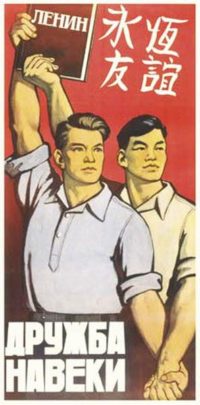 Feb 14: The Soviet Union and China enter into 30-year alliance of friendship and mutual assistance. The agreement includes both military and economic assistance between the two countries. It culminates a two-month visit by Chairman Mao Tze-tung (Mao Zedong) in Moscow, with Foreign Minister Chou En-lai (Zhou Enlai) joining him for the later stages of negotiations. The agreement provides for returning to Chinese control of two lines of the Manchurian railroad and the Soviet naval ports at Port Arthur. That turnover is to occur no later than the end of 1952. Chou declares that the agreements uniting the Soviet Union and Communist China, with a combined population of 700 billion people, represents a force that “is impossible to defeat.” The public terms of the treaty are mainly expressions of mutual friendship, cooperation and goodwill. The State Department says that it believes the more substantive terms of the alliance are spelled out in secret protocols.
Feb 14: The Soviet Union and China enter into 30-year alliance of friendship and mutual assistance. The agreement includes both military and economic assistance between the two countries. It culminates a two-month visit by Chairman Mao Tze-tung (Mao Zedong) in Moscow, with Foreign Minister Chou En-lai (Zhou Enlai) joining him for the later stages of negotiations. The agreement provides for returning to Chinese control of two lines of the Manchurian railroad and the Soviet naval ports at Port Arthur. That turnover is to occur no later than the end of 1952. Chou declares that the agreements uniting the Soviet Union and Communist China, with a combined population of 700 billion people, represents a force that “is impossible to defeat.” The public terms of the treaty are mainly expressions of mutual friendship, cooperation and goodwill. The State Department says that it believes the more substantive terms of the alliance are spelled out in secret protocols.
▲Wednesday, February 15
![]() Feb 15: The Walt Disney animated film Cinderella premieres in Boston.
Feb 15: The Walt Disney animated film Cinderella premieres in Boston.
▲Thursday, February 16
▲Friday, February 17
Chinese New Year
![]() Feb 17: UMW issues another back-to-work order. United Mine Workers union leader John L. Lewis orders the striking 375,000 soft coal miners to return to work “forthwith,” using stronger language than that used in last weekend’s order. Lewis issued that first order in compliance to a federal court order, but miners ignored it on Monday. Striking miners will ignore this one as well. Meanwhile, both sides in the long labor dispute say that there has been no progress in negotiations that resumed on Wednesday.
Feb 17: UMW issues another back-to-work order. United Mine Workers union leader John L. Lewis orders the striking 375,000 soft coal miners to return to work “forthwith,” using stronger language than that used in last weekend’s order. Lewis issued that first order in compliance to a federal court order, but miners ignored it on Monday. Striking miners will ignore this one as well. Meanwhile, both sides in the long labor dispute say that there has been no progress in negotiations that resumed on Wednesday.
![]()
 Feb 17: Long Island commuter train crash kills 29. Two Long Island Rail Road trains crash head-on in Rockville Centre, killing twenty-nine and injuring 115. As part of a grade crossing elimination program, a temporary track had been set up alongside the original line to carry one train at a time past 2,000 feet (610 m) of construction. The eastbound train from Penn Station runs through a stop signal and proceeds onto the single temporary track. At almost exactly the same time, a westbound train is leaving the Rockville Centre station and entering the same track. This accident is the worst so far in LIRR’s history.
Feb 17: Long Island commuter train crash kills 29. Two Long Island Rail Road trains crash head-on in Rockville Centre, killing twenty-nine and injuring 115. As part of a grade crossing elimination program, a temporary track had been set up alongside the original line to carry one train at a time past 2,000 feet (610 m) of construction. The eastbound train from Penn Station runs through a stop signal and proceeds onto the single temporary track. At almost exactly the same time, a westbound train is leaving the Rockville Centre station and entering the same track. This accident is the worst so far in LIRR’s history.
▲Saturday, February 18
▲Sunday, February 19
![]()
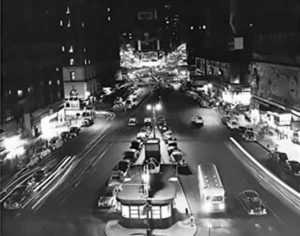 Feb 19: New York, Minnesota begin brownout actions to conserve coal. With striking coal miners defying return-to-work orders from a Federal court and United Mine Workers president John L. Lewis, state officials in New York and Minnesota begin a brownout campaign to conserve coal stocks. The famous massive electric signs of Times Square are turned off, and other signs lighting Broadway theaters, stores or other advertising are either shut off or dimmed. Cities in Minnesota dim or shut off streetlights and businesses reduce lit signage and overnight lighting. Several cities begin rationing coal, and as many as 23,000 steelworkers around Pittsburgh are furloughed because there’s no longer enough coal to keep the blast furnaces and open hearths running.
Feb 19: New York, Minnesota begin brownout actions to conserve coal. With striking coal miners defying return-to-work orders from a Federal court and United Mine Workers president John L. Lewis, state officials in New York and Minnesota begin a brownout campaign to conserve coal stocks. The famous massive electric signs of Times Square are turned off, and other signs lighting Broadway theaters, stores or other advertising are either shut off or dimmed. Cities in Minnesota dim or shut off streetlights and businesses reduce lit signage and overnight lighting. Several cities begin rationing coal, and as many as 23,000 steelworkers around Pittsburgh are furloughed because there’s no longer enough coal to keep the blast furnaces and open hearths running.
▲Monday, February 20
![]()
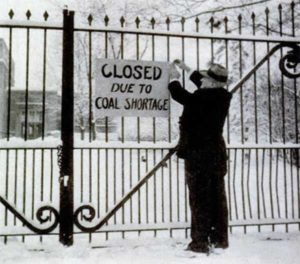 Feb 20: Government cites UMW for contempt of court; shortages become critical in some cities. The U.S. Justice Department files a formal complaint asking that the United Mine Workers — but not its leader, John L. Lewis — be cited for civil and criminal contempt of court over coal miners’ refusal to heed an earlier court order to go back to work. The judge considers the motion, and renews the injunction ordering the miners back to work until March 3. The extension is given in order to consider arguments for issuing a full eighty-day injunction under the Taft-Hartley Act. The effects of the coal shortage had been eased somewhat by milder than normal winter weather. But that ends today as an arctic blast with high winds sends temperatures plunging into the single digits and lower throughout the northeast and midwest, and even to the low twenties in parts of Florida. Pittsburgh dealers say they have effectively run out of coal for home heating. Hospitals in New York City are running on a truck-to-furnace basis, with coal being burned as fast as it can be delivered. St. Louis public schools go on a two-day-a-week schedule, and Illinois Gov. Adlai Stevenson (D) declares a state of emergency. Many cities are now under strict coal rationing with many more considering it.
Feb 20: Government cites UMW for contempt of court; shortages become critical in some cities. The U.S. Justice Department files a formal complaint asking that the United Mine Workers — but not its leader, John L. Lewis — be cited for civil and criminal contempt of court over coal miners’ refusal to heed an earlier court order to go back to work. The judge considers the motion, and renews the injunction ordering the miners back to work until March 3. The extension is given in order to consider arguments for issuing a full eighty-day injunction under the Taft-Hartley Act. The effects of the coal shortage had been eased somewhat by milder than normal winter weather. But that ends today as an arctic blast with high winds sends temperatures plunging into the single digits and lower throughout the northeast and midwest, and even to the low twenties in parts of Florida. Pittsburgh dealers say they have effectively run out of coal for home heating. Hospitals in New York City are running on a truck-to-furnace basis, with coal being burned as fast as it can be delivered. St. Louis public schools go on a two-day-a-week schedule, and Illinois Gov. Adlai Stevenson (D) declares a state of emergency. Many cities are now under strict coal rationing with many more considering it.
▲Tuesday, February 21
![]() Feb 21: Coal rationing, energy cutbacks, layoffs spread. The crippling coal strike, coupled with harsh winter weather, places increasing pressures on state and local governments and utilities. New York City, which imposed a “brownout” last weekend, is now rationing coal for home heating. Coal dealers in New Jersey are imposing informal limits on deliveries. In Chicago, voluntary “brownouts” darken advertising displays on State Street. Public schools are closed in Rockford, Illinois; Buffalo, New York; and several other cities in the Northeast and Midwest. Two thousand more steel workers are laid off in Youngstown and the Southern Railroad adds another thousand to its list of furloughed employees.
Feb 21: Coal rationing, energy cutbacks, layoffs spread. The crippling coal strike, coupled with harsh winter weather, places increasing pressures on state and local governments and utilities. New York City, which imposed a “brownout” last weekend, is now rationing coal for home heating. Coal dealers in New Jersey are imposing informal limits on deliveries. In Chicago, voluntary “brownouts” darken advertising displays on State Street. Public schools are closed in Rockford, Illinois; Buffalo, New York; and several other cities in the Northeast and Midwest. Two thousand more steel workers are laid off in Youngstown and the Southern Railroad adds another thousand to its list of furloughed employees.
![]()
 Feb 21: The U.S. breaks diplomatic relations with Bulgaria. The break occurs a month after the Communist country declared the American chief minister Donald R. Heath persona non grata, which came after months of angry accusations over the treatment of the American legation in Sofia. The State Department’s announcement explains that the break in relations follows a “series of restrictions, insults and harassments” inflicted on the legation in flagrant “disregard of acceptable international practice.” It accuses Sofia of a “campaign of systematic persecution,” including torture and killing, against Bulgarian nationals employed at the American embassy. Some of those Bulgarian nationals, employed as clerical workers, housekeeping staff and translators, have been arested and charged by Bulgarian police for espionage. This is the first break in diplomatic relations with a Communist country since the end of World War II.
Feb 21: The U.S. breaks diplomatic relations with Bulgaria. The break occurs a month after the Communist country declared the American chief minister Donald R. Heath persona non grata, which came after months of angry accusations over the treatment of the American legation in Sofia. The State Department’s announcement explains that the break in relations follows a “series of restrictions, insults and harassments” inflicted on the legation in flagrant “disregard of acceptable international practice.” It accuses Sofia of a “campaign of systematic persecution,” including torture and killing, against Bulgarian nationals employed at the American embassy. Some of those Bulgarian nationals, employed as clerical workers, housekeeping staff and translators, have been arested and charged by Bulgarian police for espionage. This is the first break in diplomatic relations with a Communist country since the end of World War II.
![]() Feb 21: African prince rejects British plea to give up throne. Seretse Khama, chief of the African Bamanhwato tribe of the British protectorate of Bechuanaland (Botswana), has rejected a British plea to give up his throne for the sake of Commonwealth unity. In 1947, Khama married Ruth Williams, a white clerk at Lloyds of London, while he was in London to study and practice law. The marriage was controversial back in Bechanaland at first, but since 1949 the Bamangwato people fully embraced their “White Queen,” and the heads of the Bamangwato tribe has confirmed Khama has their prince. Khama tells the British government that his future is in the hands of the Bamangwanto people. Two British Cabinet officers are reported to have pleaded with Khama to abdicate in a two-hour meeting over concerns about antagonizing South Africa. They are identified as Philip Noel-Baker, head of the Commonwealth Relations Department, and Lord Christopher Addison, Labour leader and chief government spokesman in the House of Lords.
Feb 21: African prince rejects British plea to give up throne. Seretse Khama, chief of the African Bamanhwato tribe of the British protectorate of Bechuanaland (Botswana), has rejected a British plea to give up his throne for the sake of Commonwealth unity. In 1947, Khama married Ruth Williams, a white clerk at Lloyds of London, while he was in London to study and practice law. The marriage was controversial back in Bechanaland at first, but since 1949 the Bamangwato people fully embraced their “White Queen,” and the heads of the Bamangwato tribe has confirmed Khama has their prince. Khama tells the British government that his future is in the hands of the Bamangwanto people. Two British Cabinet officers are reported to have pleaded with Khama to abdicate in a two-hour meeting over concerns about antagonizing South Africa. They are identified as Philip Noel-Baker, head of the Commonwealth Relations Department, and Lord Christopher Addison, Labour leader and chief government spokesman in the House of Lords.
▲Wednesday, February 22
Ash Wednesday
Washington’s Birthday (US)
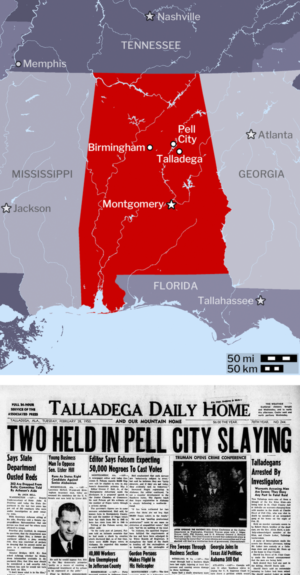 Feb 22: Klan kills white Alabama storekeeper. An unmasked gang shoots a white storekeeper to death in front of his home outside of Pell City, Alabama. Just before he is shot, Charlie Hurst, 39, tells his son, “I think the Ku Kluxers are after me.” The son, nineteen-year-old Howard Hurst is wounded in the hip. The trouble begins at 7:30 p.m. when a carload of men call the elder Hurst out of his home. When Hurst emerges, two men begin dragging him to the car. When Hurst calls out for help, Howard comes out of the house with a .22 caliber rifle. Howard tries to shoot, but he can’t get the rifle to fire. A man inside the car leans out and and fires at Howard, wounding him in the hip. Charlie then break free and runs back to Howard, grabs the rifle, and fires three shots at the car. A man in the car fires back, hitting Charlie three times. The Hurst men are rushed to the Pell City hospital, where the father dies soon after arrival. One of the raiders, Roy Heath, will tear up his KKK membership, denounce the group and shoot himself the following Sunday. Two are arrested on Monday: Talladega businessman Claude Luker, and self-styled Baptist preacher Rev. Alvin Horn, who is an acknowledged KKK leader for the region. Three more are arrested in the following weeks: farmer Albert Wilson, 32, Pell City textile worker Charles Charlisle, Jr., 23 and Pell City mattress manufacturer and former policeman C.M. Hunter. Carlisle will be convicted of manslaughter and sentenced to five years’ imprisonment. He will be paroled after three years. The others will be acquitted or see their charges dropped.
Feb 22: Klan kills white Alabama storekeeper. An unmasked gang shoots a white storekeeper to death in front of his home outside of Pell City, Alabama. Just before he is shot, Charlie Hurst, 39, tells his son, “I think the Ku Kluxers are after me.” The son, nineteen-year-old Howard Hurst is wounded in the hip. The trouble begins at 7:30 p.m. when a carload of men call the elder Hurst out of his home. When Hurst emerges, two men begin dragging him to the car. When Hurst calls out for help, Howard comes out of the house with a .22 caliber rifle. Howard tries to shoot, but he can’t get the rifle to fire. A man inside the car leans out and and fires at Howard, wounding him in the hip. Charlie then break free and runs back to Howard, grabs the rifle, and fires three shots at the car. A man in the car fires back, hitting Charlie three times. The Hurst men are rushed to the Pell City hospital, where the father dies soon after arrival. One of the raiders, Roy Heath, will tear up his KKK membership, denounce the group and shoot himself the following Sunday. Two are arrested on Monday: Talladega businessman Claude Luker, and self-styled Baptist preacher Rev. Alvin Horn, who is an acknowledged KKK leader for the region. Three more are arrested in the following weeks: farmer Albert Wilson, 32, Pell City textile worker Charles Charlisle, Jr., 23 and Pell City mattress manufacturer and former policeman C.M. Hunter. Carlisle will be convicted of manslaughter and sentenced to five years’ imprisonment. He will be paroled after three years. The others will be acquitted or see their charges dropped.![]() Feb 22: Coal strike causes shortages in 7 states, idles 60,000 other workers. Seven states are now rationing coal supplies: Illinois, Massachusetts, Minnesota, New York, Ohio, Pennsylvania, and Virginia. A United Press survey shows that about 60,000 workers in other industries are out of work because of coal shortages. Another 40,000 workers at Ford Motor Company and 23,000 employees at the Jones & Laughlin Steel Company are expected to be laid off soon. This figures are in addition to about 370,000 striking coal miners.
Feb 22: Coal strike causes shortages in 7 states, idles 60,000 other workers. Seven states are now rationing coal supplies: Illinois, Massachusetts, Minnesota, New York, Ohio, Pennsylvania, and Virginia. A United Press survey shows that about 60,000 workers in other industries are out of work because of coal shortages. Another 40,000 workers at Ford Motor Company and 23,000 employees at the Jones & Laughlin Steel Company are expected to be laid off soon. This figures are in addition to about 370,000 striking coal miners.
▲Thursday, February 23
![]()
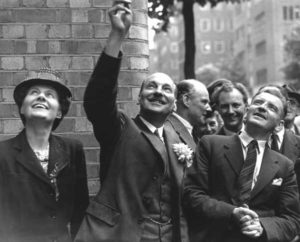 Feb 23: Labour retains slim majority in British general elections. About 84% of Britons turn out in soggy weather to vote in the general elections. Early returns indicate that Labour, under Prime Minister Clement Attlee, might retain a majority of fifty to seventy seats. But as Conservative votes come in from rural areas, Labour’s majority drops to five. Labour loses a net 78 seats to retain 315, while the Conservatives under Winston Churchill gain 90 for a total of 298. The Liberals under Clement Davies lose three and retain nine, with three more seats held by two minor parties. The main issue in this election is a law passed last November which allows the government to nationalize Britain’s basic industries. Attlee will stay on as Prime Minister, but he will have much less room to maneuver as he tries to nationalize Britain’s iron and steel industries. Many do not expect this government to last long.
Feb 23: Labour retains slim majority in British general elections. About 84% of Britons turn out in soggy weather to vote in the general elections. Early returns indicate that Labour, under Prime Minister Clement Attlee, might retain a majority of fifty to seventy seats. But as Conservative votes come in from rural areas, Labour’s majority drops to five. Labour loses a net 78 seats to retain 315, while the Conservatives under Winston Churchill gain 90 for a total of 298. The Liberals under Clement Davies lose three and retain nine, with three more seats held by two minor parties. The main issue in this election is a law passed last November which allows the government to nationalize Britain’s basic industries. Attlee will stay on as Prime Minister, but he will have much less room to maneuver as he tries to nationalize Britain’s iron and steel industries. Many do not expect this government to last long.
▲Friday, February 24
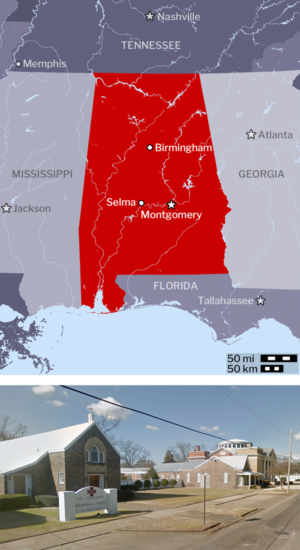 Feb 24: KKK warns Selma Catholic church. The Ku Klux Klan places warning signs on the door of St. Elizabeth’s Catholic Church in Selma, Alabama. The signs read, “The KKK is looking at you.” St. Elizabeth’s is run by the Fathers of St. Edmonds and ministers to Selma’s African-American community. The church is a mother mission supporting twelve other missions to African-American parishioners throughout the South. It also operates the Good Samaritan Hospital, an old folks home, a free library, and a grade school in Selma — all of them serving the needs of black residents who are barred from white-only institutions. Fr. Norman Lambert issues a statement: “We are doing our work while respecting all local customs regarding races; we have nothing to hide, and will discuss our efforts at any time in open. Signs which appeared on our church the past Friday night are a cowardly gesture, and may be compared to the secret police of Russia.” Similar signs also appear at Tabernacle Baptist Church just to the north on the same block, and at the newly-built Hudson High School, the city’s first public high school for African-American students.
Feb 24: KKK warns Selma Catholic church. The Ku Klux Klan places warning signs on the door of St. Elizabeth’s Catholic Church in Selma, Alabama. The signs read, “The KKK is looking at you.” St. Elizabeth’s is run by the Fathers of St. Edmonds and ministers to Selma’s African-American community. The church is a mother mission supporting twelve other missions to African-American parishioners throughout the South. It also operates the Good Samaritan Hospital, an old folks home, a free library, and a grade school in Selma — all of them serving the needs of black residents who are barred from white-only institutions. Fr. Norman Lambert issues a statement: “We are doing our work while respecting all local customs regarding races; we have nothing to hide, and will discuss our efforts at any time in open. Signs which appeared on our church the past Friday night are a cowardly gesture, and may be compared to the secret police of Russia.” Similar signs also appear at Tabernacle Baptist Church just to the north on the same block, and at the newly-built Hudson High School, the city’s first public high school for African-American students.![]() Feb 24: Federal judge orders UMW to stand trial for contempt. Federal Judge Richmond B. Keech, who cited the United Mine Workers for contempt of court last Monday, sets a trial date for next Monday for civil and criminal contempt of court. The judge refuses to accept the union’s argument that it had followed the judge’s restraining order by ordering the 372,000 striking coal miners back to work. UMW president John L. Lewis issued two calls for miners to return to work. Miners have ignored both orders. Coal operators say that the union failed to ensure that the return-to-work orders reached the union locals. The union’s lawyers say that the strike, which began as a wildcat strike last month, was never authorized by the union’s executive board. Under the UMW constitution, the executive board can only call a strike after a referendum vote of members. Since no such vote has taken place, there is no authorized strike for the union to act upon.
Feb 24: Federal judge orders UMW to stand trial for contempt. Federal Judge Richmond B. Keech, who cited the United Mine Workers for contempt of court last Monday, sets a trial date for next Monday for civil and criminal contempt of court. The judge refuses to accept the union’s argument that it had followed the judge’s restraining order by ordering the 372,000 striking coal miners back to work. UMW president John L. Lewis issued two calls for miners to return to work. Miners have ignored both orders. Coal operators say that the union failed to ensure that the return-to-work orders reached the union locals. The union’s lawyers say that the strike, which began as a wildcat strike last month, was never authorized by the union’s executive board. Under the UMW constitution, the executive board can only call a strike after a referendum vote of members. Since no such vote has taken place, there is no authorized strike for the union to act upon.
![]() Feb 24: UMW negotiations with coal operators go nowhere. With mounting coal shortages, officials in at least twenty states have taken emergency measures to ration and extend dwindling coal stocks. But negotiations between the union and coal operators have continued with no further progress. The New York Times will describe the talks this way: “Mr. Lewis was by turns genial and bitter. The operators mostly looked gloomy. For long periods — twenty minutes or more at a stretch — in the hotel sessions the two sides sat silent. At times they exchanged anecdotes. Mr. Lewis once held a long conversation with an assistant, as if no one else were present.”
Feb 24: UMW negotiations with coal operators go nowhere. With mounting coal shortages, officials in at least twenty states have taken emergency measures to ration and extend dwindling coal stocks. But negotiations between the union and coal operators have continued with no further progress. The New York Times will describe the talks this way: “Mr. Lewis was by turns genial and bitter. The operators mostly looked gloomy. For long periods — twenty minutes or more at a stretch — in the hotel sessions the two sides sat silent. At times they exchanged anecdotes. Mr. Lewis once held a long conversation with an assistant, as if no one else were present.”
![]() Feb 24: University of California to require anti-Communist loyalty oath. The Regents of the University of California vote 12-6 to require all employees in the university system to sign a loyalty oath disavowing support for Communism. The Regents set a deadline of June 30. Any faculty member who refuses to sign will be dismissed. The requirement will be overturn by the California Supreme Court in 1952.
Feb 24: University of California to require anti-Communist loyalty oath. The Regents of the University of California vote 12-6 to require all employees in the university system to sign a loyalty oath disavowing support for Communism. The Regents set a deadline of June 30. Any faculty member who refuses to sign will be dismissed. The requirement will be overturn by the California Supreme Court in 1952.
▲Saturday, February 25
![]()
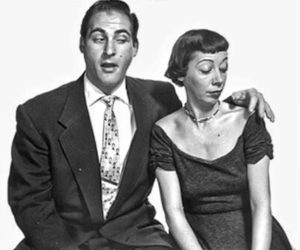 Feb 25: Your Show of Shows premieres. The profoundly influential variety television program Your Show of Shows premieres on NBC. It stars Sid Caesar, Imogene Coca, Howard Morris, Carl Reiner and James Starbuck. The program is an hour-long segment of a larger experimental 2½-hour NBC program, Saturday Night Review. The Review shows off NBC’s networking prowess — even though live networking is only available to twenty-four cities between New England and Chicago. This broadcast features programming originating from the Studebaker Theatre in Chicago and the International Theatre in New York. The Chicago portion, titled The Jack Carter Show occupies the first hour, and the remaining ninety minutes, in which Burgess Meredith serves as guest master of ceremonies, features the Sid Caesar program.
Feb 25: Your Show of Shows premieres. The profoundly influential variety television program Your Show of Shows premieres on NBC. It stars Sid Caesar, Imogene Coca, Howard Morris, Carl Reiner and James Starbuck. The program is an hour-long segment of a larger experimental 2½-hour NBC program, Saturday Night Review. The Review shows off NBC’s networking prowess — even though live networking is only available to twenty-four cities between New England and Chicago. This broadcast features programming originating from the Studebaker Theatre in Chicago and the International Theatre in New York. The Chicago portion, titled The Jack Carter Show occupies the first hour, and the remaining ninety minutes, in which Burgess Meredith serves as guest master of ceremonies, features the Sid Caesar program.
▲Sunday, February 26
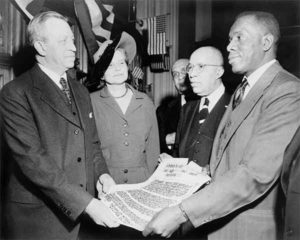 Feb 26: Federal Judge: The South is sick with “cancer of segregation.” Federal District Judge J. Waties Waring speaks before a packed Convent Avenue Baptist Church in Harlem. “We don’t have a Negro problem in the South,” says the Charleston, South Carolina, native. “We have a white problem. … “The white men in my part of the country are sick mentally, obsessed with their false doctrines.” Waring attacks “gradualism” as “the most dangerous doctrine of our age. … The cancer of segregation will never be cured by the sedative of gradualism. An operation is necessary, and you can send us the doctors.” He compares advocates of gradualism with alcoholics: they want to be left alone to solve their own problems, an approach that never works. “When an autocratic, despotic, and undemocratic group withholds the vote from any body of citizens, then it’s time for somebody — a President, a judge, or maybe even a policeman — to come along and straighten it out.” In 1947, Waring struck down a South Carolina law that allowed the Democratic Party — the only real political party that exists in the state — to bar African-Americans from its membership, and to allow only Party members to vote in the Democratic primary. Winning the Democratic primary is tantamount to winning the general election. Waring says that the 1948 primary, the first election in which Negroes were allowed to vote, was “the quietest election we ever had” despite predictions that “blood would fill the streets. …The lesson of that is this: If you tell them what to do and if you make them do it, it’s going to come out all right.” Dr. Horatio Hill, director of the Baptist Educational Center, presents Judge Waring with a scroll in recognition of his work in civil rights.
Feb 26: Federal Judge: The South is sick with “cancer of segregation.” Federal District Judge J. Waties Waring speaks before a packed Convent Avenue Baptist Church in Harlem. “We don’t have a Negro problem in the South,” says the Charleston, South Carolina, native. “We have a white problem. … “The white men in my part of the country are sick mentally, obsessed with their false doctrines.” Waring attacks “gradualism” as “the most dangerous doctrine of our age. … The cancer of segregation will never be cured by the sedative of gradualism. An operation is necessary, and you can send us the doctors.” He compares advocates of gradualism with alcoholics: they want to be left alone to solve their own problems, an approach that never works. “When an autocratic, despotic, and undemocratic group withholds the vote from any body of citizens, then it’s time for somebody — a President, a judge, or maybe even a policeman — to come along and straighten it out.” In 1947, Waring struck down a South Carolina law that allowed the Democratic Party — the only real political party that exists in the state — to bar African-Americans from its membership, and to allow only Party members to vote in the Democratic primary. Winning the Democratic primary is tantamount to winning the general election. Waring says that the 1948 primary, the first election in which Negroes were allowed to vote, was “the quietest election we ever had” despite predictions that “blood would fill the streets. …The lesson of that is this: If you tell them what to do and if you make them do it, it’s going to come out all right.” Dr. Horatio Hill, director of the Baptist Educational Center, presents Judge Waring with a scroll in recognition of his work in civil rights.▲Monday, February 27
![]()
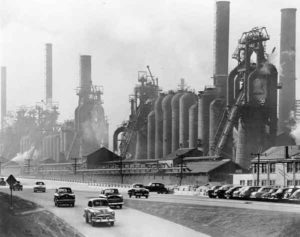 Feb 27: US Steel cuts production due to coal strike; communities close schools, impose coal rationing. The United States Steel Corporation, which the New York Times calls “the colossus of the steel industry,” has been relatively unaffected by the coal strike, until now. Today, the company’s giant steel mills around Pittsburgh have cut their production in half. This cutback is the most dramatic in a steel industry that has been crippled by the coal shortages brought on by the strike. Meanwhile, with freezing weather descending on much of the country, many communities are struggling to keep homes warm and industrial furnaces going. Michigan joins seven other states to impose rationing. Indianapolis is forced to close all of its public schools. The Army has ordered all posts with less than a thirty-day supply to drastically cut consumption. Price gouging is taking place in several Midwestern states, with prices double or triple what they had been. Police are called out to coal yards in Chicago to quell arguments between housewives and coal distributors.
Feb 27: US Steel cuts production due to coal strike; communities close schools, impose coal rationing. The United States Steel Corporation, which the New York Times calls “the colossus of the steel industry,” has been relatively unaffected by the coal strike, until now. Today, the company’s giant steel mills around Pittsburgh have cut their production in half. This cutback is the most dramatic in a steel industry that has been crippled by the coal shortages brought on by the strike. Meanwhile, with freezing weather descending on much of the country, many communities are struggling to keep homes warm and industrial furnaces going. Michigan joins seven other states to impose rationing. Indianapolis is forced to close all of its public schools. The Army has ordered all posts with less than a thirty-day supply to drastically cut consumption. Price gouging is taking place in several Midwestern states, with prices double or triple what they had been. Police are called out to coal yards in Chicago to quell arguments between housewives and coal distributors.
![]() Feb 27: UMW contempt trial begins. The civil and criminal contempt of court trial of the United Mine Workers union begins in Washington, D.C. before Federal Judge Richmond B. Keech. The Justice Department alleges that the 370,000 coal miners have been directed by their union to remain out on strike in defiance of the judge’s temporary restraining order requiring them to go back to work. The UMW responds that the strike began as a wildcat strike by the workers, that the union never authorized or called for a strike, that the union twice complied with the judges order, and that the decision of the 375,000 miners to stay off the job was the result of individuals arriving at their own decisions. The trial will continue through Wednesday.
Feb 27: UMW contempt trial begins. The civil and criminal contempt of court trial of the United Mine Workers union begins in Washington, D.C. before Federal Judge Richmond B. Keech. The Justice Department alleges that the 370,000 coal miners have been directed by their union to remain out on strike in defiance of the judge’s temporary restraining order requiring them to go back to work. The UMW responds that the strike began as a wildcat strike by the workers, that the union never authorized or called for a strike, that the union twice complied with the judges order, and that the decision of the 375,000 miners to stay off the job was the result of individuals arriving at their own decisions. The trial will continue through Wednesday.
▲Tuesday, February 28
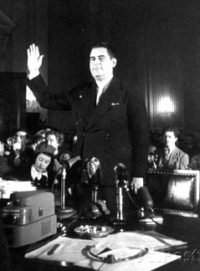 Feb 28: The State Department reports dismissing 91 homosexuals. U.S. Undersecretary of State John Peurifoy testifies before a Senate subcommittee that the State Department has dismissed 202 employees since 1947 who were considered “poor security risks.” One was fired and the rest were allowed to resign. According to Peurifoy, 91 of those let go were “for moral weakness … Most of them were homosexual. In fact, I would say all of them were.” Peurifoy’s statement goes mostly unnoticed in the papers, meriting just a paragraph or two in the larger story about Acheson’s testimony about Alger Hiss. But in the following few weeks, Peurifoy’s 91 homosexuals will catch the attention of Republican leaders and conservative newspaper editors and columnists. McCarthy and his supporters will quickly turn the red scare into a lavender one for the rest of the year.
Feb 28: The State Department reports dismissing 91 homosexuals. U.S. Undersecretary of State John Peurifoy testifies before a Senate subcommittee that the State Department has dismissed 202 employees since 1947 who were considered “poor security risks.” One was fired and the rest were allowed to resign. According to Peurifoy, 91 of those let go were “for moral weakness … Most of them were homosexual. In fact, I would say all of them were.” Peurifoy’s statement goes mostly unnoticed in the papers, meriting just a paragraph or two in the larger story about Acheson’s testimony about Alger Hiss. But in the following few weeks, Peurifoy’s 91 homosexuals will catch the attention of Republican leaders and conservative newspaper editors and columnists. McCarthy and his supporters will quickly turn the red scare into a lavender one for the rest of the year.![]()
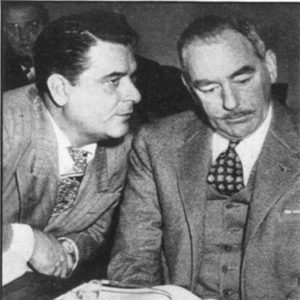 Feb 28: Secretary of State Acheson says he never condoned disloyalty. Dean Achesen appears before a Senate subcommittee to say that he has never condoned the crime for which Alger Hiss was convicted, and that he would never “knowingly tolerate” disloyalty to the United States. Acheson makes this assertion “for the benefit of those who would create doubt where none existed.” He castigates Republicans for “misrepresentations” of his comments last month when he said he did not intend to turn his back on his old friend, Alger Hiss. Sen. Styles Bridges (R-NH) angrily asked whether “a friend” — including someone such as Acheson — “of a person convicted of perjury in connection with a treasonable act be a security risk?” Acheson frostily replied that such a matter should “be looked into.” He also explains that the 202 of the State Department’s 17,000 employees have been dismissed in the last two years as a matter of questionable loyalty, discretion, or habits, and that several factors were involved with security cases. But he also makes it plain to the subcommittee that he was recanting nothing, apologizing for nothing, and that he would stick to his stand with regard to Hiss wherever it may lead.
Feb 28: Secretary of State Acheson says he never condoned disloyalty. Dean Achesen appears before a Senate subcommittee to say that he has never condoned the crime for which Alger Hiss was convicted, and that he would never “knowingly tolerate” disloyalty to the United States. Acheson makes this assertion “for the benefit of those who would create doubt where none existed.” He castigates Republicans for “misrepresentations” of his comments last month when he said he did not intend to turn his back on his old friend, Alger Hiss. Sen. Styles Bridges (R-NH) angrily asked whether “a friend” — including someone such as Acheson — “of a person convicted of perjury in connection with a treasonable act be a security risk?” Acheson frostily replied that such a matter should “be looked into.” He also explains that the 202 of the State Department’s 17,000 employees have been dismissed in the last two years as a matter of questionable loyalty, discretion, or habits, and that several factors were involved with security cases. But he also makes it plain to the subcommittee that he was recanting nothing, apologizing for nothing, and that he would stick to his stand with regard to Hiss wherever it may lead.
![[Emphasis Mine]](http://jimburroway.com/wp-content/uploads/2018/01/DragInTheOpen.jpg)
